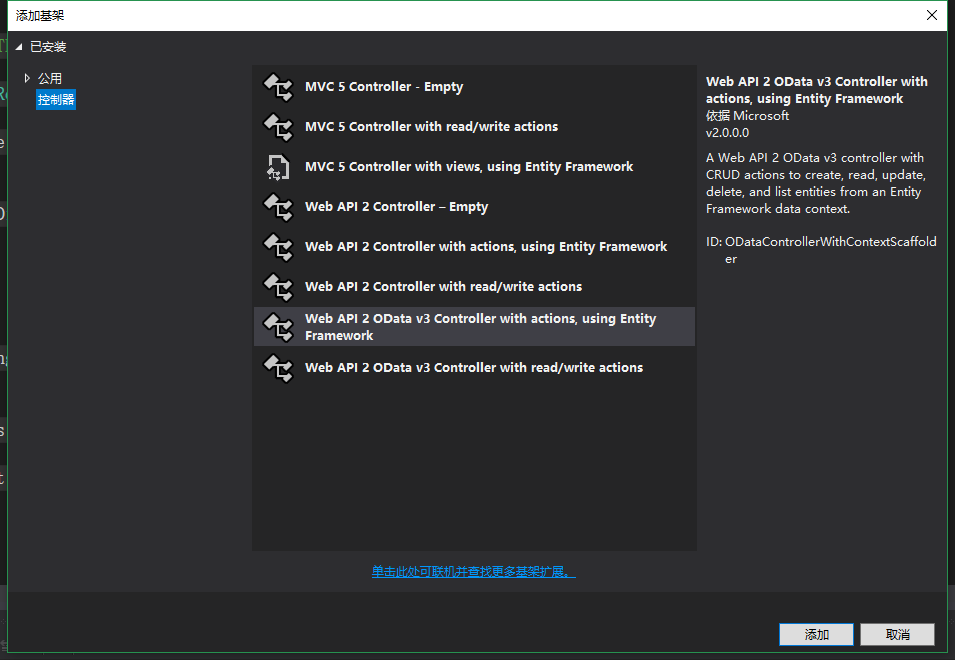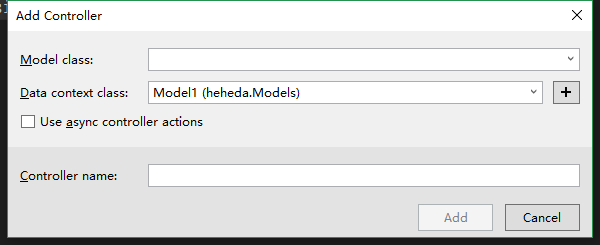快速搭建WebAPI(Odata+Code-First)附Odata条件查询表~
Odata是什么?
开放数据协议(Open Data Protocol,缩写OData)是一种描述如何创建和访问Restful服务的OASIS标准。该标准由微软发起,前三个版本1.0、2.0、3.0都是微软开放标准,遵循 [1] 。第四个版本4.0于2014年3月17日在OASIS投票通过成为开放工业标准 [2] 。
为什么需要OData?
OData是一个协议,一个标准。所以这个问题等同于为什么我们需要协议。类比TCP协议就可以理解一般。假设你开发的组件必须要和某个第三方组件通信,如果第三方组件不支持TCP而只支持其内部开发的一个私有协议,你就肯定头大了,你必须在你的组件里单独为其实现这个私有协议。如果大家都支持TCP协议,不就省事了么。这就是标准协议的作用:协议和标准用于制定一个统一通用的规则。 我们只需要按照这个协议或标准生产组件,那么这个组件就可以方便的和其他组件集成/协作。而无须根据其他组件的私有标准定制化组件。
如何使用OData?

Odata目前已经不怎么更新了,目前最高的5.7已经停留在2015年8月21 远古时代,然后我们还需要在WebApiConfig.cs中配置Odata
ODataModelBuilder builder = new ODataConventionModelBuilder();
builder.EntitySet<TRoles>("TRoles");
builder.EntitySet<TUsers>("TUsers");
builder.EntitySet<TUsersRoles>("TUsersRoles");
config.Routes.MapODataServiceRoute("odata", "odata", builder.GetEdmModel());
其中builder.EntitySet<TRoles>("TRoles"); 需要注意的是EntitySet这个方法是对你的实体类进行配置,其底层是要获取的类型放到它的配置项里。
Code-First 方式 create DataBase
Context.cs
public Model1()
: base("name=CodeFirstDemo")
{
} public DbSet<TUsers> Users { get; set; }
public DbSet<TRoles> Roles { get; set; }
public DbSet<TUsersRoles> UsersRoles { get; set; }
其它的三个类就不写上来了,不想占用博客园的资源,也不想写没有意义的!
创建webAPIController


创建完的代码展示:
using System;
using System.Collections.Generic;
using System.Data;
using System.Data.Entity;
using System.Data.Entity.Infrastructure;
using System.Linq;
using System.Net;
using System.Net.Http;
using System.Web.Http;
using System.Web.Http.ModelBinding;
using System.Web.Http.OData;
using System.Web.Http.OData.Routing;
using heheda.Models; namespace heheda.Controllers
{
/*
The WebApiConfig class may require additional changes to add a route for this controller. Merge these statements into the Register method of the WebApiConfig class as applicable. Note that OData URLs are case sensitive. using System.Web.Http.OData.Builder;
using System.Web.Http.OData.Extensions;
using heheda.Models;
ODataConventionModelBuilder builder = new ODataConventionModelBuilder();
builder.EntitySet<TRoles>("TRoles");
builder.EntitySet<TUsersRoles>("UsersRoles");
config.Routes.MapODataServiceRoute("odata", "odata", builder.GetEdmModel());
*/
public class TRolesController : ODataController
{
private Model1 db = new Model1(); // GET: odata/TRoles
[EnableQuery]
public IQueryable<TRoles> GetTRoles()
{
return db.Roles;
} // GET: odata/TRoles(5)
[EnableQuery]
public SingleResult<TRoles> GetTRoles([FromODataUri] int key)
{
return SingleResult.Create(db.Roles.Where(tRoles => tRoles.Id == key));
} // PUT: odata/TRoles(5)
public IHttpActionResult Put([FromODataUri] int key, Delta<TRoles> patch)
{
Validate(patch.GetEntity()); if (!ModelState.IsValid)
{
return BadRequest(ModelState);
} TRoles tRoles = db.Roles.Find(key);
if (tRoles == null)
{
return NotFound();
} patch.Put(tRoles); try
{
db.SaveChanges();
}
catch (DbUpdateConcurrencyException)
{
if (!TRolesExists(key))
{
return NotFound();
}
else
{
throw;
}
} return Updated(tRoles);
} // POST: odata/TRoles
public IHttpActionResult Post(TRoles tRoles)
{
if (!ModelState.IsValid)
{
return BadRequest(ModelState);
} db.Roles.Add(tRoles);
db.SaveChanges(); return Created(tRoles);
} // PATCH: odata/TRoles(5)
[AcceptVerbs("PATCH", "MERGE")]
public IHttpActionResult Patch([FromODataUri] int key, Delta<TRoles> patch)
{
Validate(patch.GetEntity()); if (!ModelState.IsValid)
{
return BadRequest(ModelState);
} TRoles tRoles = db.Roles.Find(key);
if (tRoles == null)
{
return NotFound();
} patch.Patch(tRoles); try
{
db.SaveChanges();
}
catch (DbUpdateConcurrencyException)
{
if (!TRolesExists(key))
{
return NotFound();
}
else
{
throw;
}
} return Updated(tRoles);
} // DELETE: odata/TRoles(5)
public IHttpActionResult Delete([FromODataUri] int key)
{
TRoles tRoles = db.Roles.Find(key);
if (tRoles == null)
{
return NotFound();
} db.Roles.Remove(tRoles);
db.SaveChanges(); return StatusCode(HttpStatusCode.NoContent);
} // GET: odata/TRoles(5)/TRolesUsersList
[EnableQuery]
public IQueryable<TUsersRoles> GetTRolesUsersList([FromODataUri] int key)
{
return db.Roles.Where(m => m.Id == key).SelectMany(m => m.TRolesUsersList);
} protected override void Dispose(bool disposing)
{
if (disposing)
{
db.Dispose();
}
base.Dispose(disposing);
} private bool TRolesExists(int key)
{
return db.Roles.Count(e => e.Id == key) > 0;
}
}
}
在之后我们就可以在前端中去通过这个协议规则去过滤我们的数据了!
Odata筛选数据规则表
|
操作 |
URL |
说明 |
| $filter | http://localhost:8090/api/Meetings?$filter=ProductName eq 'Tofu' | 根据表达式的状态返回结果(返回ProductName 等于Tofu的Products) |
| $orderby | http://localhost:8090/api/Meetings?$orderby=ProductName | 根据结果排序(根据ProductName列排序) |
| $skip | http://localhost:8090/api/Meetings?$skip=10 | 越过结果中的n条数据,常用于分页 |
| $top | http://localhost:8090/api/Meetings?$top=10 | 返回结果中的前n条记录,常用于分页 |
| $select | http://localhost:8090/api/Meetings?$filter=ProductName eq 'Tofu'&$select=ProductName,UnitPrice | 选择需要返回的属性 |
| $expand | http://localhost:8090/api/Meetings?$expand=Supplier | 返回Products中包含的导航属性(关联属性)Supplier |
| $inlinecount | http://localhost:8090/api/Meetings?$inlinecount=allpages | 向服务器获取符合条件的资源总数(分页的total值) |
快速搭建WebAPI(Odata+Code-First)附Odata条件查询表~的更多相关文章
- [转]OData的初步认识 OData v4 Client Code Generator
本文转自:http://www.cnblogs.com/1zhk/p/5356053.html What – OData是什么? OData - Open Data Protocol,是一个设计和使用 ...
- .net core系列之《sdk和runtime区别及使用CLI在Ubuntu上快速搭建Console,WebApi,MVC三大应用模型》
一.需要安装的软件 1.虚拟机安装Ubuntu系统(本人用的是vmware-14.1.12和buntu-18.04) 2.Xshell或 Putty(连接ssh服务) 3.FileZilla(ftp上 ...
- 利用Columnal网格系统快速搭建网站的基本布局结构
1.下面是一些对响应式设计提供了不同程度支持的CSS框架: (1)Semantic(http://semantic.gs); (2)Skeleton(http://getskeleton.com); ...
- Jenkins+Maven+SVN快速搭建持续集成环境(转)
Jenkins是一个可扩展的持续集成引擎,Jenkins非常易于安装和配置,简单易用,下面看看我们是如何几分钟就快速搭建一个持续集成环境吧. 假设我们目前已经有2个maven项目:entities(J ...
- WAMP Server助你在Windows上快速搭建PHP集成环境
WAMP Server助你在Windows上快速搭建PHP集成环境 原文地址 我想只要爬过几天网的同学都会知道PHP吧,异次元的新版本就是基于PHP的WordPress程序制造出来的,还有国内绝大部分 ...
- 拿nodejs快速搭建简单Oauth认证和restful API server攻略
拿nodejs快速搭建简单Oauth认证和restful API server攻略:http://blog.csdn.net/zhaoweitco/article/details/21708955 最 ...
- 基于 Jenkins 快速搭建持续集成环境--转
源地址:http://www.ibm.com/developerworks/cn/java/j-lo-jenkins/ 持续集成是一种软件开发实践,对于提高软件开发效率并保障软件开发质量提供了理论基础 ...
- Jenkins 快速搭建持续集成环境
持续集成概述 什么是持续集成 随着软件开发复杂度的不断提高,团队开发成员间如何更好地协同工作以确保软件开发的质量已经慢慢成为开发过程中不可回避的问题.尤其是近些年来,敏捷(Agile) 在软件工程领域 ...
- Jenkins快速搭建持续集成
基于Jenkins快速搭建持续集成环境 Jenkins+tortoisesvn+MSBuild做到持续集成 附Jenkins的使用:http://www.infoq.com/cn/articles/M ...
随机推荐
- margin-top的兼容问题
产生的条件:子元素给了margin-top,并且父元素没有浮也没有其他样式,浏览器解析的结果是父元素下去了. 解决方法:1.给子元素或者父元素添加浮动,缺点:如果不需要浮动,添加浮动也页面布局会乱 2 ...
- ORM之SQLALchemy
今天来聊一聊 Python 的 ORM 框架 SQLAlchemy SQLAlchemy 没有 Django 的 Models 好用!因为models是Django自带的ORM框架,也正是因为是Dja ...
- Fiddler和app抓包
1:请在“运行”,即下面这个地方输入certmgr.msc并回车,打开证书管理. 打开后,请点击操作--查找证书,如下所示: 然后输入“fiddler”查找所有相关证书,如下所示: 可以看到,我们找到 ...
- RF无线射频电路设计干货分享
1.概述:射频(RF)PCB设计,在目前公开出版的理论上具有很多不确定性,常被形容为一种“黑色艺术”.通常情况下,对于微波以下频段的电路(包括低频和低频数字电路),在全面掌握各类设计原则前提下的仔细规 ...
- 【省选十连测之九】【DP】【组合计数去重】【欧拉函数】基本题
目录 题意: 输入格式: 输出格式: 数据范围: 思路: 嵌套题的转移 基本题的转移 Part1 Part2 Part3 代码 题意: 这是一个关于括号组合的题. 首先定义一道题是由'(',')',' ...
- Android应用程序支持不同屏幕(尺寸、密度)
how to build a user interface using Android layouts for all types of devices 使用Android布局设计的UI接口用于不同的 ...
- vue解决加载闪烁问题
<!DOCTYPE html><html> <head> <meta charset="utf-8"> <title>& ...
- cookie设置域名问题,cookie跨域
今天研究一天发现cookie无法设置除当前域名或者其父域名之外的其他domain. 这个是浏览器出于对cookie的保护造成的,也就是cookie无法跨域设置. 对于子域名也有如下规则,当前域名只能设 ...
- 20181117-python第二章学习小结-part2
浮点型补充: 有限小数与无限循环小数,不包括无理数! 小数点后面的数据运算太复杂,精确度不及整数! 尽量使用科学计数表示小数 列表学习(语法) 创建:[] list = [] #创建空表 list ...
- 华为ssh远程登录,配置
